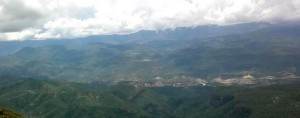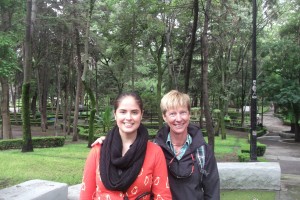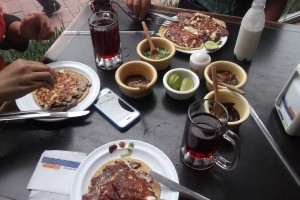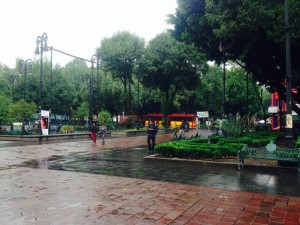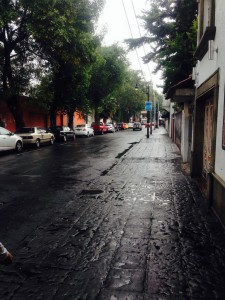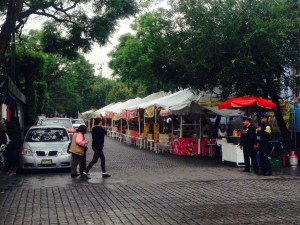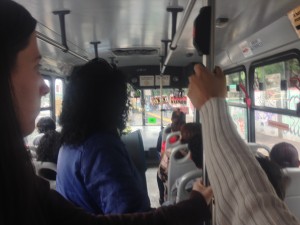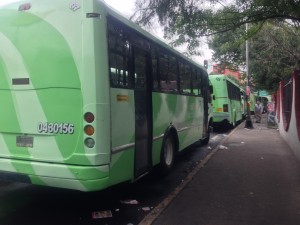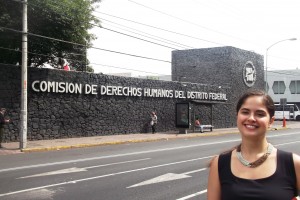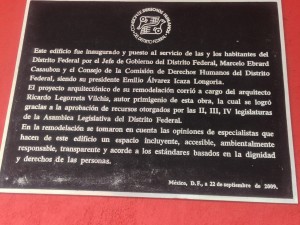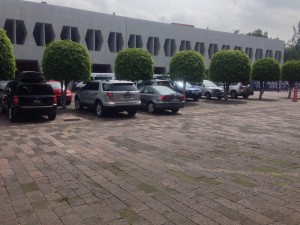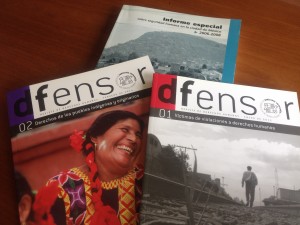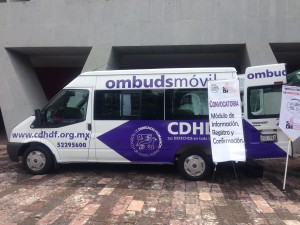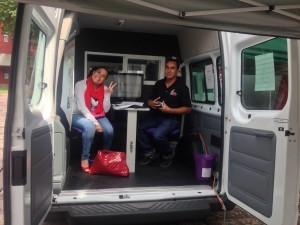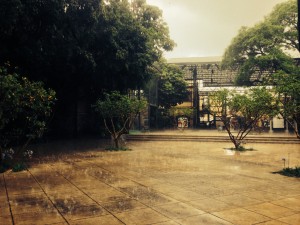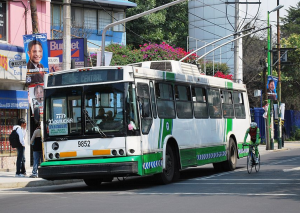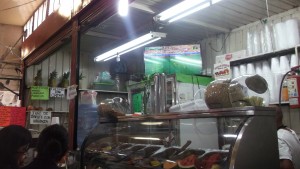Archive for category Jessica Sanchez
My contribution to water shortage, its contamination and its waste.
Posted by Jessica Sanchez in Jessica Sanchez, Mexico on July 29, 2014
Roughly two weeks ago we traveled Northwest to the state of Jalisco to capture the stories of communities facing different battles over water. We met a family who stands tall in the face of giants, corporate and governmental. Indomitable, they’ve chosen to make a life out of their fight to help keep their local river clean. We also met members of a small village whose land stands in the way of a lofty water deal for the local government. The women we spoke to showed us that unity and courage are their weapons of choice in their fight to save their homes, the homes that have been in their families for generations.
Though the stories came from different people, from the North of Mexico to the South, of different ages and with different experiences, their struggle, their fight, resonates with me. So I ask myself, “Why have I been so disconnected from all this?”
Before becoming a Peacebuilder I never thought about water. I never felt deprived of it: never have I turned on the knob in a shower wondering if there’d be water for my use, not to mention hot water. I never felt the fear of getting sick from it: never have I thought twice about whether the tall glass of water I drink after a workout is safe to drink, or if the water I use when opening the faucet to wash my hands might give me a rash or cause cancer. I’ve never even thought about recycling it: I don’t save the water after washing dishes or taking a bath, to wash clothes or mop. I’ve always simply had water. So I never thought about my need for it, about it’s place in my everyday life.
As a human rights advocate, I’m use to thinking about problems in terms of people and the deprivation of some right. Of a protagonist and an antagonist. Someone to defend and someone to blame. But when it comes to water, there is no single victim. No single perpetrator. There is no living thing on earth that can survive without it, and because of it, water is itself an entity. A fundamental building block for life. Yet, millions don’t have access to clean drinking water, thousands of children die daily around the world from contaminated water, and still globally governments are planning to privatize it.
Now, after weeks of researching water issues in Mexico and listening to the water stories affecting entire communities, I realize I’ve played a part in all this. I’ve contributed to its scarcity, its contamination, its waste and its disproportionate supply. Whether it’s because I’ve paid little to no attention to water regulation in the past, take 30-minute showers, fail to participate in water preservation programs, or throw away that not quite empty water bottle that’s been sitting in the car for a month, every misuse and inattentive behavior adds-up. For 28 years, I’ve been ignorant of this. Now is my time to stop contributing to the bad and to make a difference for the good. To make the small changes that can affect myself and many others for generations to come.
You’re saying it’s my duty to respond to a complete stranger because they find me attractive?
Posted by Jessica Sanchez in Jessica Sanchez, Mexico on July 14, 2014
This past Saturday, I had a peculiar encounter with two men on the metro. I was on my way to see a friend, it was a sunny day and we’ve had few of them lately so I wanted to be out to soak up the sunshine. I boarded the train and sat in one of a few empty seats. There were men and women with children. I sat on a corner seat near the door for a quicker exit, with my earphones on as usual, taking in the tunes and staring at the emptiness passing by outside the train.
There was a man standing in front of the doors to my immediate right who looked as if he was waiting to exit the train. I saw him lean towards me saying something, I looked up at him, pulled out my right earphone and looked at him asking to repeat himself. “Is this train going towards barranca del muerto? I just want to check I’m heading in the right direction.” I nodded and responded, “yes,” putting my earphone back in its place. A few seconds passed and again he leaned over mouthing something. I glared straight ahead as if I had not heard him, but he continued and leaned closer, so again I pulled my earphone out with a look of inquiry. “…Are you heading home from work? Tired much?” is all I could make out. I smirked, “I’m actually headed to see my boyfriend,” to which he nodded in acknowledgment, returning to his place, standing tall in front of the door without any further questions. He got off two stations later.
A guy sitting immediately to my left had been glaring at me since I’d sat down. He witnessed what happened, and after the man standing in front of the door had exited the car, he laughed and said “you cut him off.” I had my earphones on with music still playing and ignored his comment. He then tapped me on my shoulder to repeat himself. I took my left earphone out with a look of inquiry and he repeated himself, “you cut him off.” I smirked in acknowledgement of his comment and placed my earphone back in my ear, observing the little girl and her mother sitting directly in front of me. I sat tall with a stern look on my face, thinking to myself, “if I look bothered or annoyed when he tries to talk to me, will he get the point?” the answer was no. The music playing in my earphones was loud, but he chose to ignore it and continued speaking, though all I made out was gestures and not a word of what he was trying to say. I rolled my eyes and stared ahead, calm and collected enjoying my playlist, but he continued.
I took my earphone out, let out a deep sigh of annoyance and turned over to him. “What’s wrong why can’t you just say hi, I already heard you have a boyfriend, no big deal, soon you’ll get off the train and I’ll never see you again” he said. “Right,” I acknowledged, “but what if I don’t want to have a conversation with you?” “I’m just being friendly, trying to talk to someone on the train, what’s wrong with that?” he replied. “That’s fine and all, but some people, like myself (I emphasized), just want to take a train ride from point A to point B, thinking about the things they want to think about, listening to music and keeping to themselves,” I tried to reason. “Where are you from? what do you do?” he inquired. “I really don’t feel like being interviewed,” I responded with an assertive tone. “But you’re in a world full of people, who want to interact, and I’m just being a gentleman trying to strike up a conversation, it would be rude of you to ignore me,” he responded.
Something inside me went off on hearing his misuse of the word “gentleman.” I thought about moving to another seat, but I wasn’t intimidated and the last thing I wanted was for him to think he could move me. Calmly, but quite annoyed I stared straight into the mother’s eyes who’d sat across from me all this time, responding to him, “what makes you think that I am rude for not responding, as opposed to you who are trying very hard to strike up a conversation with a complete stranger who is making it clear they do not wish to speak to you?” He paused for a few seconds, attempting to formulate a response. The mother stared at me with a slight smirk on her face.
With an air of accomplishment he responded slowly, as if the words coming from his mouth were spoken just as soon as he thought of each and every one of them, “You’re an attractive female, on a train full of people. There are going to be men who want to speak to you. You cannot be rude and just ignore them.” Time seemed to slow as he uttered these words, and in my mind, “Whaaaaat? Is this really happening? Did he just say that? What year is it?” Calling on all of my patience and serenity, I laughed.
I stared at him, confusion in my eyes and my mouth wide open as if staring at some unconscionable phenomenon. I then glared across at the child playing wistfully, her mother intent on our conversation. Slowly enunciating each and every word I said, “You’re saying it’s my duty to respond to a complete stranger because they find me attractive?” I paused, “That makes no sense … I owe you nothing, I owe all others who may think they have the right to a response, absolutely nothing … are you understanding me? … Nothing,” I repeated as the train pulled into my station. He blurted something out, but I’d tuned him out, aware of his determined ignorance.
I turned to him, smiled and said “have a nice day.” I walked out of the train laughing lightly. All I could think to do was laugh at the situation, though inside I was mad and shocked at the same time.
Daily I feel the gaze of men as I walk along the street or on public transportation. It’s very uncomfortable. To have someone say what this man said to me on the train was astonishing, but I almost wish I could have had more time to reason with him, to make him see it is not ok to put that burden on me of having to answer to anyone just because they believe I should, be I female or attravice, or both. He seemed so convinced of what he said. He genuinely believed that I was rude, and not he for pushing me to converse with him. It makes me wonder how the women he encounters in daily life deal with it, do they ignore him? do they fall for it? How did he ever come to believe he is entitled to a response? How many others like him are there? And, how many others like me?
Re-discovering the meaning of water in the land I thought I knew so well.
Posted by Jessica Sanchez in Jessica Sanchez, Mexico on July 4, 2014
I’m halfway through my journey as a Peacebuilder in Mexico, and every week I’ve come to re-discover the land I thought I knew. It’s one thing to be a native of Mexico, it’s another to be a foreigner in Mexico, and still another to see Mexico and the U.S. as “home,” even when I feel like a native of and a foreigner in, both.
Let me explain.
The phrase designated to identify me by census questionnaires, law school applications, insurance agents and many other U.S. institutions is “Mexican-American.” “Mexican-American,” has always seemed to me to be a superficial oversimplification of how a person born in the U.S. might identify themselves. It’s hard enough for a person to find an identity, but doing so under this classification only multiplies the obstacles. Needless to say, I grew up confused about my place in school and U.S. society in general, not to mention how school and society saw me. In my journey to find an identity, all that was clear was that I was never just considered “American,” hence I never just felt “American,” though I was born, raised and educated in the U.S.
Crossing the border didn’t make my understanding any clearer. My parents are from a small village, Villa Guerrero, in Jalisco, Mexico, a place I’ve visited for different lengths of time just about every year since I was a child. A place filled with family, friends and memories. I was raised on Mexican traditions and culture, I speak fluent Spanish (by that I mean that people in D.F. often don’t even realize I wasn’t born in Mexico), I’m very invested in the political, social and economic progress of the country, and do in fact also call Mexico “home”. Yet, natives identify me as a “gringa.”
Today I have much to learn about myself and my identity, and though I do not call myself “Mexican-American,” I live happy and passionately as a hybrid. My dual identity provides me the ability to understand, adapt and belong to two very different countries. It facilitates my ability see things natives and foreigners of each country may not understand. As a Peacebuilder, however, I have come to see things that had escaped me; that natives and foreigners might see and understand more easily because of their long or short standing relationship with the country.
What do I mean by this? Water.
It’s not until I became a Peacebuilder that I began to see the role that water played in the village I’d known all my life. Water had surrounded me in one way or another since I was kid and now I realize I’ve known about water in Mexico for a very long time. My father and his family own ranches in Jalisco. Often he’d take me along for a ride to see the cattle, the lands, the horses, instilling in me the importance of water in keeping them healthy. He’d show me the river that nourished his crops and divided his land from others; the niches dug out to drain water and guide it to where it was most needed; the wells that collected the water supplied to the land; the water holes that kept the cattle hydrated; and the lake that provided water to the village’s inhabitants. Every visit, water was a topic of conversation and there was never enough of it.
Until this point I’d never much paid attention to the issue of water in Villa. I’d never felt its scarcity. I’d always had it when I needed it. That tends to be the norm though, doesn’t it? An issue often doesn’t come alive for someone, until they’re affected by it in one way or another. In the case of water, most people don’t worry about until they don’t have it. Now I see it, care about it, and attempt to do my part to conserve it. I feel guilty for my lack of awareness all this time.
This week I asked my mother about water in Villa, something I’d never done before. She responded, “it’s rained a lot lately” and that because of it Villa was beautiful. Now I understand this simple response in a new light. Villa is beautiful because it’s not suffering from a lack of water: it’s inhabitants have enough to drink and use for daily chores, the animals it breeds and maintains to survive are healthy because they’re hydrated, and because the soil is nourished it’s crops may flourish. Now I realize that when the answer is, “there is little water, it hasn’t rained,” the reality will be far more complicated.
Welcoming a new Peacebuilder and my own problems with water.
Posted by Jessica Sanchez in Jessica Sanchez, Mexico on June 27, 2014
This week has proven an exciting and productive week. Amy Clark joined us from Colorado and we took a short trip down Avenida de los Insurgentes, a major avenue splitting D.F. into east and west. Overcast skies loomed above us, as cars zoomed by and we exchanged laughs about our experiences in arriving to D.F. We shared our first meal together of tasty rib tacos and salsas, green and red, to suit everyone’s palate. Though I’ve had plenty of tacos in my time here, it never seizes to amaze me how many different ways they can be prepared, tacos from Califa were delish. It felt like a meal with friends. Amy’s cheerful smile and vibrant personality quickly showed her to be a great addition to our little D.F. team. I’m very grateful to have her here for the next few weeks.
On another note, Ainhoa and I got to hear our first individual story on water issues. There’s more details about this encounter in Ainhoa’s blog, so I won’t repeat them, but I must share how phenomenal it felt to finally get to hear a real person’s experience about water issues in Mexico. All this time we’d been compiling organization contacts, using spreadsheets, sending emails, making phone calls; just for the chance to get to hear the real stories. Though it was short, it was worth it and now I feel like we’re on a roll. This one individual has connected us to another potential contact and we plan on meeting her soon. Thank goodness our work is paying off! Now that we’ve experienced our first story, I feel a bit more at ease.
Ironically, I had my own run-in with a water issue this very morning. I share an apartment in a large complex. On the bottom floor of by building is an elevator, two doors to exit the building in opposite directions, and a number of handwritten sheets of paper hung up to notify residents of bills that need to be paid or of upcoming events. I tend to ignore these notes because they usually don’t pertain to me. There was one particular note, however, that I failed to notice, but proved to be very relevant for me. On a white sheet, in big black marker was spelled out “homeowners, Friday, June 27th the cisterna will be washed, set water aside. Administration”. From what I’ve gathered, “cisternas” are tanks where water is stored to distribute either to a home or building. Since, our building’s cisterna is to be cleaned today, my roommates and I were suppose to set water aside. Unfortunately, it seems none of us took notice of it and I had just enough water to wash my face this morning! I came to Mexico to gather stories of the water issues residents face and I think today brought me a lot closer to understanding them, but also to appreciating how important water is in my daily life.
Coyoacan
Posted by Jessica Sanchez in Jessica Sanchez, Mexico on June 24, 2014
One of my favorite places in D.F. is in Coyoacan, a delegation Northeast of UNAM, approximately 10 minutes by trolebus, from my apartment. At its center, a plaza bursts with vibrant colors. Restaurants, bars, and small shops form two large squares, divided down the middle by a small avenue. Inside these squares, benches, trees and lush shrubs decorate the plaza. On a rainy day like today, water fills the pores on the stone grounds. The wet soil smells of comfort and the surrounding greenery is rich with life.
This place, so different from anything in the US, feels like home. Walking the streets of Coyoacan I see beautifully decorated buildings, each adjacent to the next, an endless array of tones, personality and design. Uniform and disorderly, in their natural state.
At the Coyoacan Market, there are rows and rows of small posts, selling everything from candy, to flowers, to fruit, to toys, meat, and meals ready to eat. At every turn someone pops out of their post to greet you with a smile and ask if there’s anything you’re interested in. There’s a welcoming buzz in the background, of people shopping, locals selling, laughter, and gossip.
Here, I stop by my favorite fruit stand, where the owners know my face and my order almost by heart. The fruit here is sweeter than anything I’ve ever had in the US. My recommendation: Banana, strawberries, guava, figs, papaya, mango, all diced up and topped with honey and granola. I always order just one more thing: 1 liter of fresh squeezed grapefruit juice, with just a bit of orange juice for sweetness. It’s heaven and since I arrived in Mexico, Coyoacan has formed an integral part of my routine and the tasty fruit, a daily part of my diet.
A visit to D.F.’s Human Rights Commission
Posted by Jessica Sanchez in Jessica Sanchez, Mexico on June 20, 2014
Today, Ainhoa and I tried yet another mode of transportation. Called a, “micro” or “pesera” these are independent buses that travel to various destinations and cover routes not frequented by government transportation systems.
One of these “micros” transported us to D.F.’s Human Rights Commission (CDHDF), a local organ with its foundations in Mexico’s constitution, and an authority autonomous of the local and federal government. I was pleasantly surprised by the Commission’s atmosphere and quickly noticed a stark contrast between it’s environment and that of CONAGUA, which we visited this past monday. Not surprisingly. I can really only think to describe our interaction with CONAGUA as bureaucratic.
CDHDF on the other hand was quite the opposite. I’ve passed the Commission numerous times throughout my time in Mexico, it happens to be across the street from one of my favorite parks in D.F., called Viveros. From a major avenue, Universidad, the Commission welcomed us with big bold letters. Built to reflect its theme of transparency, its open spaces contain plenty of glass, both inside and out, full of friendly-faced staff and citizens waiting to be assisted. We were greeted with open arms by a Director, who made every effort to answer our questions and provide us with the Commission’s materials. He informed us that it’s the Commission’s job to assist any individual, free of charge, on human rights issues, whether they walk-in, phone-in, or file a claim online.
We got to see the Commission’s new Mobile Ombuds vans, that are to travel around the city for individuals to receive assistance. They basically look like mobile offices, as pictured below.
I left the Commission with a feeling of excitement. Glad to know we’ll be returning soon and hoping to speak to many others. I guess that’s the difference between visiting an organization who sees water rights as a human right, CDHDF, as opposed to an organization that sees water simply as resource to be distributed.
After we left, we stopped for a bite to eat nearby right before a heavy rainfall. Left without an umbrella, we were stranded for a while inside a coffee-shop.
This is not the first time the rain keeps us waiting, and I’m quite sure it won’t be the last.
Our first interview! Plus flooding, more flooding, and the World Cup.
Posted by Jessica Sanchez in Jessica Sanchez, Mexico on June 18, 2014
Yesterday, aside from early, the day was off to a rainy start. You see the weather in D.F. is unpredictable, so much so that its predictable. Every day will bring rain, overcast skies, a scorching sun and dry heat. That means pulling-off an outfit versatile enough to keep you cool, warm, and dry – every day. It’s actually become a joke between a friend and I, to see who’s outfit can make it through the day’s weather the best. I can’t complain, it’s really made me a pretty skilled dresser.
I digress, back to the beginning of the day. At 8:00 yesterday morning I took what locals call the “trolebus”, a public transportation bus that runs electrically off wires connected to poles throughout the city, to my partner Ainhoa’s place in Coyoacan.
At 9a a driver from CONAGUA, Mexico’s National Water Commission, picked us up and we traveled about 30 minutes crossing into Mexico City to CONAGUA’s facilities in Texcoco. As we drove out from D.F. we slowed numerous times due to flooding, even though the morning rainfall was light. This happens often. Anytime it rains, there’s flooding all over the city, causing major traffic jams and slowing public transportation, even the metro.
Though D.F. is notorious for it’s chaotic traffic, our drive was smooth and seeing as neither Ainhoa nor I get to travel by car much, we simply glared out the window, marveling at the size and diversity of the city. Crossing under bridges, past stadiums, colorful buildings, streets vendors and more, I sat silent, amazed by the many sites I had never seen.
At Texcoco, we learned about the origins of Mexico City and how its foundation was laid atop a body of water, which has plenty to do with the inundations that plague the city to this day. We then headed back to D.F. to another of CONAGUA’s facilities, where we finished there at around 1:45p. We headed back to Coyoacan with our driver anxious to drop us off to return and watch the Mexico v. Brazil game in the World Cup. We got dropped off near a market, where every restaurant, niche and stall had a television tuned into the game. There was plenty of emotion in the air, as the sounds of excitement or disappointment filled the market with every play.
What a time to be in Mexico.
The World Cup v. Mexico’s Energy Reform, 1:0
Posted by Jessica Sanchez in Jessica Sanchez, Mexico on June 15, 2014
As previously mentioned, I arrived in Distrito Federal roughly nine months ago in search of an understanding of the newly evolving Judiciary. It was not until the past few days, however, that I got the opportunity to observe a different side of the Mexican Government, its Legislature. With it, have come a few surprises.
This past week saw the beginning of discussions on energy reform initiatives for secondary laws presented by President Enrique Peña Nieto in April 2014. The Mexican Senate designated the job of discussing initiatives affecting 21 secondary laws to the Joint-Commissions on Energy and Legislative Studies. The objective of discussing these laws, some new and some amended, is to provide procedural regulations through which the implementation of the constitutional reform on energy may take place. Up to this point, the phrase “energy reform” might sound like a good thing. For those who might watch mainstream Spanish channels, they might be convinced of this. Unfortunately, this is far from reality. The novelty of President Pena Nieto’s reform is that it breaks the stand taken by President Lazaro Cardenas seventy-six years ago to nationalize Mexico’s oil industry. The reform effectively opens Mexico up to foreign investment, accompanied by exploitation of its land and natural resources, including its increasingly scarce fresh water supply. The biggest threat is what has been termed as “fracking”, a method of extracting natural gas from shale reserves deep in the earth’s subsoil. Invented by U.S. oil and gas giant Halliburton, fracking has spread throughout fifteen U.S. states with numerous “fraccidents” reported, and many vigilant states fighting to keep it out of their towns and away from their water sources.
I have taken the time to watch the Joint-Commissions, and observe, for the first time in my life, how the Mexican Legislature handles itself. I was also interested in watching the country’s primary parties, PRI (center), PAN (right wing), and PRD (left wing), along with others, discuss one of the most important reforms in Mexico’s history. I would never have anticipated what I’d see next.
The discussions began June 10 and quickly it was obvious that there was strife between the parties. On the one hand were PRI and PAN Senators. Holding the majority of votes, they sat smug, calm and collected, not to mention often distracted by their cell phones. I quickly felt put-off by their demeanor and condescending address of the issues. While their PRD counterparts, with the minority of votes, displayed themselves aggressive, wide-eyed and often highly offended. I’d never heard politicians speak so blatantly about the other party, and much less about the laws being discussed. It was an all-out soap-opera drama, live and on-air, and I mean that in a good way. The PRD Senators blamed the PRI and PAN for working together to approve initiatives that open Mexico up to a world of exploitation, to the detriment of the very people they’re suppose to represent. I was very surprised. I am not one who is very fond of politicians in general, but the PRD members’ candor, their well grounded oppositions, and most importantly their passion for the people they stand to represent, was moving.
In the last few days it has become obvious that PAN and PRI have little, if anything to change, much less discuss with regards to the initiatives proposed by the Executive. The reason for this and the PRD’s reactions became clear in media interviews, where a PAN Senator blatantly admitted PAN and PRI had already reached an 95% agreement on the initiatives, with the Executive, and without the opinion of PRD members. All before even having completed discussions on the first of four debates on the initiatives. In other words, the debate is not a debate. With the majority of votes held by PRI and PAN, they will continue to sit back and carry on with the discussions, but only for procedure’s sake. While PRD members can only carry out their arguments in hope that the Mexican people are watching and listening. Unfortunately, PRD lost the battle to have the discussions held after the World Cup. So chances are the majority of the country will be watching the scoreboard, with few listening to the warnings given by PRD about the dangers that loom with the energy reform. I can’t help but feel extremely disillusioned and disheartened by the discussions in the Joint-Commissions.
Though I am well aware of the corruption issues plaguing this country, the discussions display a level of disregard for the future of the country that leaves me truly astounded. If Mexico’s politicians are so readily available to sell out their country’s oil reserves for economic incentives, how can they be expected to protect the public’s right to it’s most fundamental resource – water?
Fulbright to Peacebuilder: Transitioning to a new journey in Mexico.
Posted by Jessica Sanchez in Jessica Sanchez, Mexico on May 25, 2014
I write this blog reminiscing about the last nine months I’ve spent in Distrito Federal (D.F.), Mexico. Excited about the upcoming eight weeks as a Peacebuilder and the stories they’ll bring with them.
I’ve been lucky enough to study in D.F. as a Fulbright Fellow, learning about historical human rights reforms from attorneys, scholars, professors, students and activists, from within the Mexican Supreme Court, U.N.A.M., I.T.A.M. and other local institutions. Coming to question and understand what a “human right” means theoretically and in-practice, within the country’s evolving legal structure. As this journey comes to a close, I feel nothing less than inspired and humbled by the people I have met and worked with, not to mention the honor it has been to experience the brilliance of my mentors. As a Fulbright, I was enthralled with the history, substance and procedure of fundamental legal questions. This took place normally behind the doors of a courtroom, classroom, library, or coffee-shop, hardly ever interacting with the human side of human rights.
This blog marks my transition from exploring human rights in theory as a Fulbright, to encountering their human side as a Peacebuilder. What I look forward to the most as a Peacebuilder is having that opportunity to explore the human right to water rights. Coming face to face with how real individuals are affected by a lack of access to this fundamental living block, and sharing it with the world.
Living here has proven an all around life-changing experience. Though I consider myself a hybrid of sorts (educated in the U.S., but raised on Mexican traditions enforced by frequent travel across the border), I never imagined how much more there was to see, live and learn from Mexico. There’s something extraordinary about falling into the ebb and flow of this vibrant city-life, acquainting myself with its lively sounds, the hustle and bustle of its streets, the warmth of its people, its diverse landscapes, not to mention its endless array of culinary offerings.
Using these experiences as an advantage to my time as a Peacebuilder, I look forward to sharing them with you, as well as with my fellow Peacebuilder Ainhoa Martinez, and using them to explore a new side of D.F. and Mexico. I’m profoundly thankful for this unique opportunity to share these stories. Giving a voice to stakeholders may be the only viable chance they receive to spread word of their struggle, a struggle common to many, many more. I hope to make their obstacles heard, their voices come alive and reach you in time to make a difference.
Hasta la proxima!
Twitter: @jsanchez_int
Facebook: https://www.facebook.com/jessica.sanchez.int
Instagram: jaedaelove

